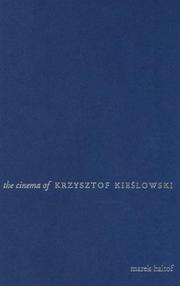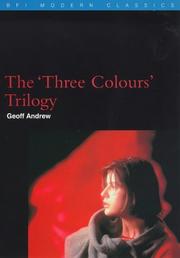| Listing 1 - 10 of 27 | << page >> |
Sort by
|

ISBN: 9781903364925 Year: 2004 Publisher: London : Wallflower Press,
Abstract | Keywords | Export | Availability | Bookmark
 Loading...
Loading...Choose an application
- Reference Manager
- EndNote
- RefWorks (Direct export to RefWorks)

ISBN: 0851705693 Year: 1998 Publisher: London : BFI Publishing,
Abstract | Keywords | Export | Availability | Bookmark
 Loading...
Loading...Choose an application
- Reference Manager
- EndNote
- RefWorks (Direct export to RefWorks)
The 'Three Colours Trilogy 'by Krzysztof Kieslowski (1941-1996) is generally regarded as a major triumph of European cinema. An examination of how the ideals of the French Revolution--liberty, equality and fraternity--have meaning in modern life, the trilogy combines visual elegance, narrative complexity, and virtuoso performances to extraordinary effect. In this highly personal appreciation of the trilogy, Geoff Andrew analyzes how Kieslowski used his command of the cinema to open up the inner lives of his characters and to chart the way in which these lives are ruled by unseen forces. For Andrew, the trilogy is a poignant, thrilling hymn to the resilience of compassion in the face of adversity. Tracing the links between the trilogy and Kieslowski's earlier work, he argues that 'Blue '(1993), 'White', and 'Red '(both 1994) are the summation of Kieslowski's art. This book, which concludes with one of the last interviews Kieslowski ever gave, is a tribute to an exceptional filmmaker.
Trois couleurs, blanc. --- Trois couleurs, bleu. --- Trois couleurs, rouge. --- Kieslowski, Krzysztof, --- Geoff Andrew --- Trois couleurs --- 791.471 KIESLOWSKI --- Motion pictures --- Cinéma --- History --- Histoire --- Kieślowski, Krzysztof, --- film --- filmgeschiedenis --- Kieslowski Krzysztof --- Polen --- Kieslowski, Krzysztof
Book
ISBN: 1003393950 1000911993 1003393950 1000912027 1032494603 Year: 2023 Publisher: New York, NY : Routledge,
Abstract | Keywords | Export | Availability | Bookmark
 Loading...
Loading...Choose an application
- Reference Manager
- EndNote
- RefWorks (Direct export to RefWorks)
"This book traces the development of the Polish theory of history, analyzing how Jerzy Topolski, Krzysztof Pomian, and Olga Tokarczuk have both built upon and transgressed the metahistorical theories of American historian Hayden White. By deconstructing and reconstructing contemporary theories of history, this research is a unique contribution to the fields of historiography and the philosophy of history"--
History --- Methodology. --- Philosophy. --- Topolski, Jerzy --- Pomian, Krzysztof --- Tokarczuk, Olga, --- White, Hayden V., --- Influence.
Book
ISBN: 9782140319884 Year: 2023 Publisher: Paris : L'Harmattan,
Abstract | Keywords | Export | Availability | Bookmark
 Loading...
Loading...Choose an application
- Reference Manager
- EndNote
- RefWorks (Direct export to RefWorks)
Selon Jean-Louis Leutrat, "les larmes sont un sujet éminemment cinématographique" . Connues pour leur faculté de purification, d'échange et d'union, les larmes permettent aux personnages de communiquer leurs désirs d'être accueillis les uns dans les autres. Mais de même, dans certains films, un combat constant entre les larmes et la séparation sert de moteur narratif et de référent visuel. Ces larmes peuvent être parfois dans l'incapacité de surgir. Une dynamique propre aux larmes permet ainsi de mieux saisir cette tension entre le besoin des personnages d'établir une union et une stratégie dominante de la séparation. Chez Douglas Sirk, Krzysztof Kieslowski et Ingmar Bergman, Dévoilement, communion et conversion sont les trois étapes de la dynamique engendrée. Dans cette dynamique, et dans la mise en crise des larmes, un transfert des larmes devient indispensable et se matérialise de différentes manières chez les trois cinéastes dont les œuvres offrent à cette donnée filmique une dimension visuelle et dramatique supplémentaire.
Larmes --- Pleurs --- Au cinéma. --- Cinéma -- Thèmes, motifs --- Au cinéma --- Thèmes, motifs --- Sirk, Douglas --- Kieslowski, Krzysztof --- Bergman, Ingmar --- Emotions in motion pictures. --- Tears --- Motion pictures --- Aesthetics. --- Sirk, Douglas, --- Kieślowski, Krzysztof, --- Bergman, Ingmar, --- Criticism and interpretation.
Multi
ISBN: 9780823267118 9780823267125 9780823267132 082326713X 0823267113 0823267121 0823267105 9780823267101 9780823269273 0823269272 Year: 2016 Publisher: New York Fordham University Press
Abstract | Keywords | Export | Availability | Bookmark
 Loading...
Loading...Choose an application
- Reference Manager
- EndNote
- RefWorks (Direct export to RefWorks)
This collection is the first to offer a genuinely interdisciplinary approach to Krzysztof Kieslowski's Decalogue, a ten-film cycle of modern tales that touch on the ethical dilemmas of the Ten Commandments. The cycle's deft handling of moral ambiguity and inventive technique established Kieslowski as a major international director. Kieslowski once said, Both the deep believer and the habitual skeptic experience toothaches in exactly the same way. Of Elephants and Toothaches takes seriously the range of thought, from theological to skeptical, condensed in the cycle's quite human tales. Bringing together scholars of film, philosophy, literature, and several religions, the volume ranges from individual responsibility, to religion in modernity, to familial bonds, to human desire and material greed. It explores Kieslowski's cycle as it relentlessly solicits an ethical response that stimulates both inner disquiet and interpersonal dialogue.
Television programs --- Religion on television --- Moral and ethical aspects --- Religion on television. --- Moral and ethical aspects. --- Kieślowski, Krzysztof, --- Criticism and interpretation. --- Dekalog (Television program) --- Biblical intertext. --- Decalogue. --- Embodied experience. --- Krzysztof Kieslowski. --- dialogue. --- ethics in film. --- film cycle. --- moral unrest.
Book
ISBN: 9782742769964 274276996X Year: 2007 Publisher: Arles: Actes Sud,
Abstract | Keywords | Export | Availability | Bookmark
 Loading...
Loading...Choose an application
- Reference Manager
- EndNote
- RefWorks (Direct export to RefWorks)
Entretiens dans lesquels le metteur en scène polonais analyse son travail sur les textes, son interprétation de Shakespeare, sa conception du travail des acteurs, l'Holocauste dans son travail, etc.
Theater --- Aesthetics --- Théâtre --- Esthétique --- Production and direction --- Production et mise en scène --- Warlikowski, Krzysztof, --- Theatre --- Production et mise en scene --- Esthetique --- Théâtre --- Esthétique --- Production et mise en scène --- Theatrical science --- regisseurs --- theater --- opera's (genre) --- Warlikowski, Krzysztof --- Warlikowski, Krzysztof (1962-....) --- Théâtre (genre littéraire) --- Théâtre polonais --- Entretiens --- Théâtre (genre littéraire) --- Théâtre polonais
Book
ISBN: 9782915547504 2915547505 Year: 2007 Publisher: Paris: Amsterdam,
Abstract | Keywords | Export | Availability | Bookmark
 Loading...
Loading...Choose an application
- Reference Manager
- EndNote
- RefWorks (Direct export to RefWorks)
Motion pictures --- History --- Kieślowski, Krzysztof, --- Hitchcock, Alfred, --- Tarkovskiĭ, Andreĭ Arsenʹevich, --- Lynch, David, --- Criticism and interpretation --- Motion pictures - History - 20th century --- Motion pictures - History - 20th century. --- Kieślowski, Krzysztof, - 1941-1996 - Criticism and interpretation --- Hitchcock, Alfred, - 1899-1980 - Criticism and interpretation --- Tarkovskiĭ, Andreĭ Arsenʹevich, - 1932-1986 - Criticism and interpretation --- Lynch, David, - 1946- - Criticism and interpretation --- Kieślowski, Krzysztof (1941-1996) --- Hitchcock, Alfred (1899-1980) --- Tarkovski, Andreï Arsenievitch (1932-1986) --- Lynch, David (1946-....) --- Cinéma --- Critique et interprétation --- Esthétique --- Kieślowski, Krzysztof, - 1941-1996 --- Hitchcock, Alfred, - 1899-1980 --- Tarkovskiĭ, Andreĭ Arsenʹevich, - 1932-1986 --- Lynch, David, - 1946 --- -Kieślowski, Krzysztof (1941-1996) --- -Motion pictures --- Lynch, David, - 1946-
Book
ISBN: 3631846770 3631863128 3631863136 Year: 2021 Publisher: Frankfurt a.M. : Peter Lang GmbH, Internationaler Verlag der Wissenschaften,
Abstract | Keywords | Export | Availability | Bookmark
 Loading...
Loading...Choose an application
- Reference Manager
- EndNote
- RefWorks (Direct export to RefWorks)
The book provides a comprehensive summary of the existing approaches to the prose poem and offers an original conception of it, remaining close to the poetic texts by following the intricate line of development of the prose poem, in Modern Polish and European literary history and literary genre theory.
Book
ISBN: 3631863136 Year: 2021 Publisher: Frankfurt a.M. : Peter Lang GmbH, Internationaler Verlag der Wissenschaften,
Abstract | Keywords | Export | Availability | Bookmark
 Loading...
Loading...Choose an application
- Reference Manager
- EndNote
- RefWorks (Direct export to RefWorks)
The book provides a comprehensive summary of the existing approaches to the prose poem and offers an original conception of it, remaining close to the poetic texts by following the intricate line of development of the prose poem, in Modern Polish and European literary history and literary genre theory.
Book
ISBN: 9780823267118 9780823267125 9780823267132 082326713X 0823267113 0823267121 0823267105 9780823267101 9780823269273 0823269272 Year: 2016 Publisher: New York : Fordham University Press,
Abstract | Keywords | Export | Availability | Bookmark
 Loading...
Loading...Choose an application
- Reference Manager
- EndNote
- RefWorks (Direct export to RefWorks)
A multi- and interdisciplinary collection of essays addressing ethical, political and aesthetic questions raised in the ten-film cycle Decalogue (1989) by Polish filmmaker Krzysztof Kieslowski.
Television programs --- Religion on television --- Moral and ethical aspects --- Television --- Programs, Television --- Shows, Television --- Television shows --- TV shows --- Television broadcasting --- Electronic program guides (Television) --- Television scripts --- Religion on television. --- Moral and ethical aspects. --- Kieślowski, Krzysztof, --- Keslevskiĭ, Kshishtof, --- Criticism and interpretation. --- Dekalog (Television program) --- Décalogue (Television program) --- Decalogo (Television program) --- Biblical intertext. --- Decalogue. --- Embodied experience. --- Krzysztof Kieslowski. --- dialogue. --- ethics in film. --- film cycle. --- moral unrest.
| Listing 1 - 10 of 27 | << page >> |
Sort by
|

 Search
Search Feedback
Feedback About UniCat
About UniCat  Help
Help News
News